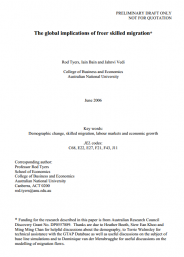
The Global Implications of Freer Skilled Migration

Abstract
One consequence of the trade and technology driven increases in skill premia in the older industrial regions since the 1980s has been a perceived “skill shortage” in those regions, along with freer migration of skilled and professional workers from developing regions. While skilled migration flows remain too small to have large short-run effects on labour markets, a further opening to skilled migrants by the industrialised North could see substantial changes in labour markets and overall growth performance. The links between demographic change, migration flows and growth performance are here explored using a new demographic sub-model that is integrated with an adaptation of the GTAP-Dynamic global economic model in which regional households are disaggregated by age and gender. Skilled migration flows are assumed to be motivated by real wage differences to an extent that is variably constrained by immigration policies. A uniform relaxation of these constraints has most effect on labour markets in the traditional migrant destinations, Australia, Western Europe and North America, where it restrains the skill premium and substantially enhances GDP growth. The skill premium is raised, however, in regions of origin, and particularly in South Asia, although the extent of this is shown to depend sensitively on the responsiveness of skill acquisition to regional skill premia.
- Issues:
- Demography, Urbanization and Migration, Economics
- Region:
- Global
- Year Published:
- 2006
- Authors:
- Rod Tyers, Iain Bain, Jahnvi Vedi
- Institution:
- Australian National University

